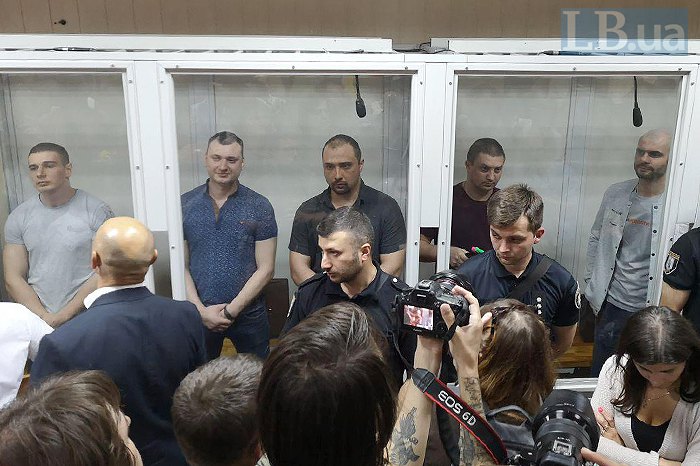Ex-Berkut officer accused of mass Maidan killing released from detention

The Svyatoshynsky District Court in Kyiv has released under 24-hour house arrest one of the five men accused of mass killing during the bloodiest day of Euromaidan. A civic organization representing the families of the victims has reacted bitterly, writing “How quickly we have all forgotten about the price which was paid for the chance to change Ukraine!”.
Lawyer and Automaidan activist Roman Maselko believes that if it had not been for the immediate outcry, all five men might have been released. They are testing the reaction, he says. For the moment, Serhi Tamtur has been released under the other four: Pavlo Abroskin; Oleksandr Marinchenko; Oleh Yanyshevsky and Serhiy Zinchenko have had their detention extended for two more months, with the next hearing only due on 20 August.
Presiding judge Serhiy Dyachuk stated only that “the court considers it necessary” to replace detention with a more lenient preventive measure, namely 24-hour house arrest with Tamtur obliged to wear an electronic bracelet. In short, exactly what the detention of Dmytro Sadovnyk, a Berkut commander accused of the same killings, was changed to back on 19 September 2014. Sadovnyk disappeared immediately and is now believed to be in Russia, where he and at least nine other ex-Berkut Maidan suspects were swiftly given Russian citizenship.
The civic group representing families of the victims reports that this release and that of Oleksandr Shcheholev are due to the Constitutional Court judgement on 25 June, finding unconstitutional the norm in the Criminal Procedure Code which stated that in the case of people charged with specific serious crimes, including state treason, sabotage or terrorism, only detention is possible. In fact, the judgement does not seem to cover murder (Article 115) and Tamtur and the other four men are on trial accused of gunning down 39 Maidan activists. All of the men could face life sentences.
Tamtur and Marynchenko, both Berkut special force officers, were the first men to be detained on suspicion of involvement in the gunning down of activists on 20 February 2014. They had been in custody since February 2014, with Zinchenko; Abroskin and their commander Sadovnyk arrested over the next two months. In July Yanyshevsky was also arrested.
Aside from Sadovnyk, who was effectively allowed to escape, all the men are charged over the killing of 39 activists in one particular area of Instytutska St. They do not deny having been there on 20 February 2014, but assert that they did not shoot any of the victims. Due to the potential life sentences that they face, they applied for and were granted Ukraine’s version of ‘trial by jury’. In such cases, the court is made up of two professional judges and three jurors. The role of the jurors is fairly limited – even in a situation where the three jurors were in agreement, they could not override the position of the two judges. They nonetheless serve as lay judges, and must be selected in the proper manner.
As well as presiding judge Serhiy Dyachuk, there is also Marina Ozdoba, and a reserve judge – Andriy Skoryn. The problem lies in the way that the three jury members, finally appointed in July, were selected. The Advocacy Advisory Panel, an initiative of lawyers representing Euromaidan victims and their families, has criticized the non-transparent process by which both judges and ‘jurors’ were selected.
Although there are very grave doubts about other Maidan trials, the fact that this one is taking so long appears to be partly because the Special Investigations Department are concerned that the eventual verdicts stand, and there are also simply a very largely number of witnesses, family members, etc.
There is obviously strong concern now that yet another former Berkut officer accused of the gravest of crimes will be allowed to escape justice.
There was outrage in the court on 16 July, with people shouting that the judges were planning to release all the men.
Oleksandr Shcheholev, the former head of the Kyiv SBU [Security Service] was released under full house arrest on 26 June.
He had been in custody since August 2015 and is accused of having taken the decision on 18 February 2014 to carry out the violent operation by enforcement officers against activists.
In his case, the judge cited the above-mentioned Constitutional Court judgement as grounds for releasing him from custody.





